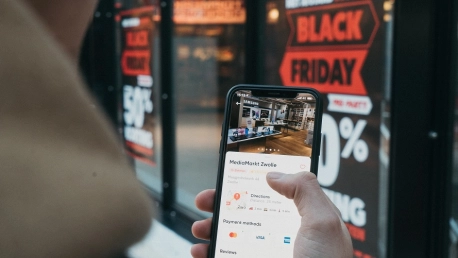People in the US and abroad have faced many problems in recent years, from the COVID-19 pandemic and its lingering effects, to a new war in Europe. But now that the healthcare crisis has ended and people’s lives finally getting back to normal, retailers can focus on developing new advertising campaigns, finding the best ways to promote their offerings, and reconnecting with consumers. The perfect opportunity for this is undoubtedly Black Friday, which marks the first day of the holiday shopping season, when most retailers put forward special deals.
Black Friday is usually celebrated the weekend after Thanksgiving. It starts on Friday and lasts until Cyber Monday. According to TechRadar, this important shopping holiday falls on the 25th of November this year. Even though more time has to pass before Americans can fully enjoy the benefits of Black Friday, some retailers and online stores have already started their end-of-year sales with a selection of Black Friday deals in October. This comes as no surprise for people in the US, as the duration of the holiday shopping season has increased over the past two years. Still, there are some things shoppers should keep in mind as they prepare for Black Friday 2022.
Holiday Shopping Starts Early this Year
The holiday shopping season will start earlier than usual in 2022. In fact, retailers like Target have announced big sales as early as October. The American retailer has recently issued a press release announcing that its biggest deals will be available three weeks earlier compared to 2021. Target also announced Weeklong Black Friday Deals and the return of the Deal of the Day. Shoppers can opt for both weekly and daily deals, which are already available in stores and online. According to Target, both options now offer the best planned prices for the holiday season on its most popular brands.
Optimizing e-Commerce Sales Strategies Is Important
According to Shopify, online stores should try to optimize their e-commerce sales strategy for Black Friday, while they still have time to do so. The e-commerce platform points to the fact that Cyber Monday proved to be the heaviest online spending day of 2021, with $10.9 billion in sales, followed by Black Friday with a total of $9 billion in sales. Although most shoppers associate Black Friday with traditional in-store sales, both online and brick-and-mortar retailers celebrate the event by creating great deals for their customers. And since Cyber Monday traditionally focuses on online sales, retailers should make sure their e-commerce sales strategies have already been updated.
Generating Buzz Is Now Vital for Online Stores
There is no question that e-commerce took off during the COVID-19 pandemic, when social distancing measures made traditional shopping difficult. Now that the healthcare crisis has been tamed, online stores will likely have to work harder to retain customers who might be tempted to return to brick-and-mortar stores. According to Shopify, “online stores should make it a priority to generate buzz and sell more” on Black Friday and Cyber Monday. This can be achieved by creating attractive offers, but also by announcing them early on platforms such as Facebook and Instagram.
e-Commerce Sales Are Expected to Rise
According to the Mastercard SpendingPulse report, online holiday sales are expected to rise 4.5% year-over-year in 2022, despite worries over surging inflation, unstable incomes, and a key plan among shoppers to cut back on impulse purchases this year. Major shopping holidays like Black Friday and Cyber Monday are also expected to boost online sales this year. Michelle Meyer, U.S. Chief Economist at Mastercard Economics Institute, predicts that American shoppers are willing and able to spend more this holiday season, because job creation, rising salaries, and significant savings will prompt them to do so.
The Future of Black Friday and Cyber Monday
Black Friday has a long history in the US, dating back at least to the 1960s. And there is good reason to believe that both this shopping holiday and the Cyber Monday will continue to grow and develop even more in the digital age. Not only has the COVID-19 pandemic already proven that there is still room for growth in e-commerce, but recent data suggests that online sales in the US will continue to grow even as the healthcare crisis subsides. Moreover, with numerous optimistic predictions for Black Friday 2022, the future looks brighter than ever.









